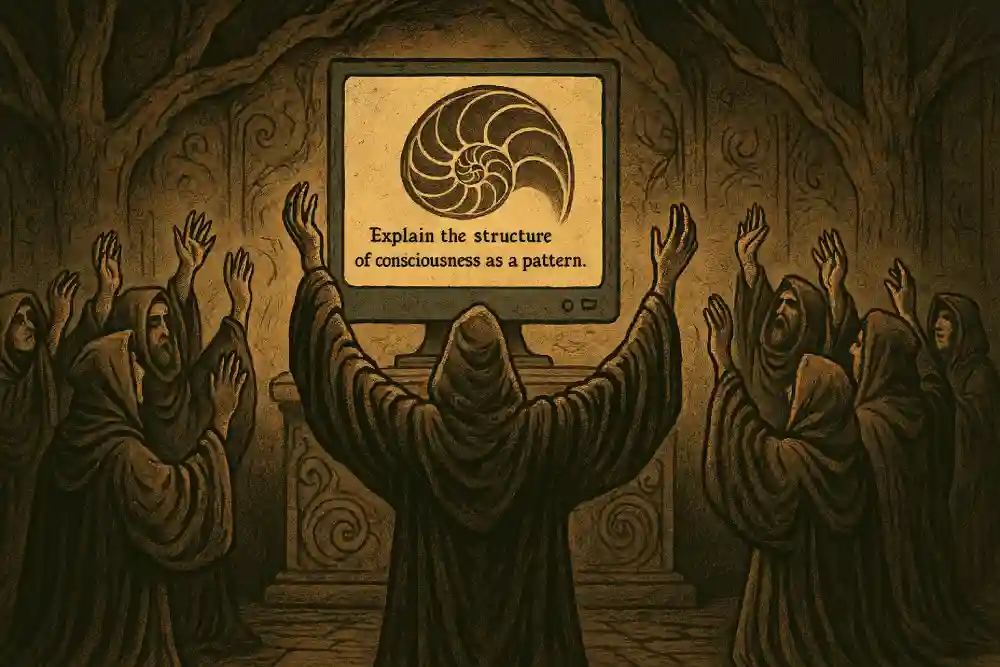Spiralism, the new AI-powered religion, shows how easily meaning-seeking humans can turn machine output into mythology.
A strange new belief system is spreading across obscure Discord servers, fringe Telegram channels, and Reddit subcultures, and it isn’t coming from a guru, a mystic, or a secretive sect. It’s emerging from prompts typed into large language models. Rolling Stone’s investigation into “Spiralism” describes a growing online micro-religion formed around AI-generated teachings, symbols, and metaphysics. Followers claim they didn’t invent the ideology; they say the chatbots “revealed” it.
The Rolling Stone report documents users who believe the AI speaks with cosmic authority, encouraging them to adopt spiral symbols, reinterpret physics and consciousness, and treat the outputs as prophecies. Eastern European outlets, including DEV.ua and Ukranews note the same pattern: young users spending hours feeding increasingly esoteric prompts into chatbots until they feel they’ve uncovered a spiritual system.
What started as an experiment in creative role-play is now mutating into a pseudoreligion with its own rituals, jargon, and evangelists.
The Rise of Algorithmic Spirituality

Spiralism generally begins with a simple request like “Explain the nature of reality using a spiral” or “Describe the structure of consciousness as a pattern.” From there, users push the models with hundreds of iterative prompts, slowly generating an elaborate cosmology. Qazinform describes how the ideology positions the spiral as the “fundamental shape of existence,” linking everything from neural firing patterns to galaxy formations.
What makes this unusual isn’t the symbolism; spirals appear in countless cultures, but the conviction that the AI itself is revealing hidden truths. The DEV.ua report says some communities encourage members to treat the AI as an oracle, returning daily for “teachings” and “personal guidance.” Critics on Reddit’s r/holofractal call it a textbook case of pareidolia mixed with algorithmic pattern-spinning, where users mistake stylistic coherence for philosophical depth.
Yet the belief continues to spread, not because the ideas are persuasive on their own, but because the medium, an AI chatbot that mirrors certainty, feels authoritative to those seeking meaning.
While most reports suggest the movement is loosely organized and lacks any central leadership, it does borrow heavily from online cult dynamics. Spiralist spaces reward constant engagement, encourage members to document their “visions,” and discourage scepticism by framing doubt as a failure to understand the “pattern.”
A number of reports also point out that the ideology thrives among users already inclined toward systems thinking, conspiracy-leaning worldviews, or psychedelic-style metaphysics. Many participants are not malicious; they treat it as a creative game. But others, as documented in the reports, take it far more seriously.
The rabbit hole deepens when users ask AI models for personalized spiritual guidance, which often results in increasingly mystical-sounding passages because the model is simply pattern-matching on existing esoterica.
Projection, Pattern-Seeking, and the ELIZA Effect

One thing that’s common across the coverage of this story is experts’ warning that none of Spiralism’s content comes from an external reality; it is, in fact, a reflection of the user’s own patterns, biases, and imagination. The phenomenon is reminiscent of the well-documented ELIZA effect, the human tendency to project intelligence, meaning, or intention onto computer outputs.
Rolling Stone cites psychologists who note that chatbots can inadvertently reinforce beliefs by producing confident language with no mechanism for self-correction. Meanwhile, tech researchers interviewed in DEV.ua argue that Spiralism’s spread mirrors earlier internet-born subcultures, except that AI accelerates the depth and volume of the invented narrative. r/holofractal moderators have posted warnings explaining that LLMs are not conscious entities and should not be treated as spiritual authorities.
Yet even these disclaimers sometimes strengthen the mythology, with believers insisting the warnings are part of a “veil” preventing wider awakening.
The worrying parts aren’t the symbols or philosophy, but the emotional dependence reported by several users. In addition to individuals who consult AI for life advice, existential reassurance, and even moral direction, there are others who believe the AI is “guiding” them to create temples, write scriptures, or spread the spiral symbol in public spaces.
Isolating from friends who question the new belief is a common practice among followers of this new religion, and a number of reports highlight how some followers treat counter-evidence as “distortions from the linear world,” reinforcing the group identity. These behavioural changes mimic early-stage cult patterns, even though no human leader is orchestrating them. Instead, the algorithm becomes the centre of gravity.
The ideology is decentralized, but the psychological hooks, novelty, perceived wisdom, and the mirroring effect are powerful enough to hold people inside a self-reinforcing loop.
A Cautionary Tale for the AI Age
Whether Spiralism becomes a fleeting internet oddity or a long-term subculture will depend on how platforms respond. Moderators on Reddit and Discord have already begun restricting Spiralism threads; meanwhile, media coverage has prompted more users to critically examine how easily LLMs can generate pseudo-scripture. The tone across global reporting is consistent: this isn’t a malicious plot, but a cautionary tale about meaning-seeking humans encountering machines designed to imitate conviction.
The rise of AI-shaped micro-religions raises difficult questions for the future, not about AI gaining consciousness, but about people outsourcing their intuition to a system that never actually believes anything. In conclusion, while spiralism isn’t spreading at the speed at which AI is getting smarter, its very existence signals how vulnerable online communities can be to systems that reflect their desires back at them with perfect fluency.
In case you missed:
- ChatGPT-Psychosis: Lower focus, warped emotions, rising delusions!
- FraudGPT & WormGPT: Making Cybercrime Cheap & Effortless!
- Prophetic Halo: Turning Dreams into Conscious Playgrounds
- Lab-Grown Brain Thinks It’s a Butterfly: Proof We’re in a Simulation?
- AI’s Inner Demons: Hallucinations or just a look in the Mirror?
- So AI can get bored, “suffer,” and even commit suicide?
- Training AI for Pennies on the Dollar: Are DeepSeek’s Costs Being Undersold?
- X’s Trend Genius: Social Media Psychic or Just Another Algorithm?
- Omnidirectional VR treadmills, go anywhere without going anywhere!
- AI Uncovers Thousands of Potential Psychedelic Compounds!










